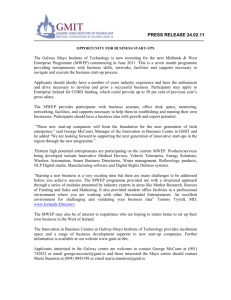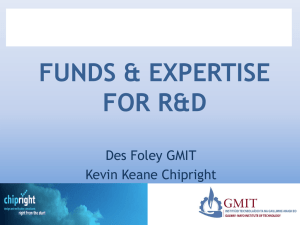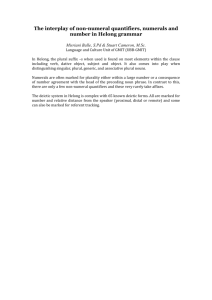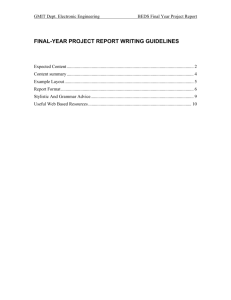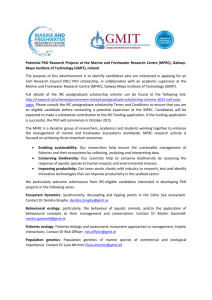ANNUAL INSTITUTIONAL QUALITY REPORT (BRIDGING)
advertisement
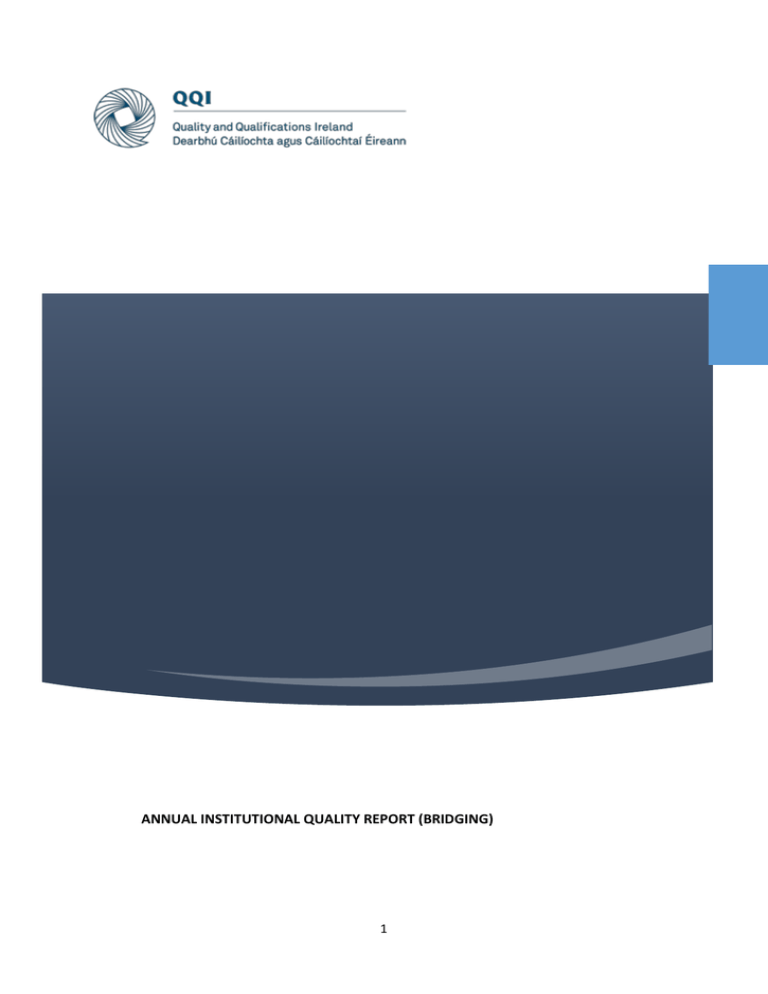
ANNUAL INSTITUTIONAL QUALITY REPORT (BRIDGING) 1 Contents 1.0 INTRODUCTION 4 2.0 QA MANAGEMENT, GOVERNANCE AND PUBLIC INFORMATION 5 3.0 QUALITY ENCHANCEMENT ACTIVITIES 15 4.0 COLLABORATION PROVISION 22 5.0 INSTITUTIONAL REVIEW (2010) 23 APPENDIX 1 COLLABORATIVE PROVISION 2 Institution Name: Galway-Mayo Institute of Technology (GMIT) Registrar Name: Michael Hannon Signature: Date: Approved by Academic Council on 13 February 2015 And by Governing Body on 19 February 2015 3 1.0 Introduction QQI and the Council of Registrars established a workgroup in 2014 to facilitate the re-engagement of QQI with the higher education sector, specifically the Institutes of Technology. The initial focus of the workgroup was to agree a protocol for the annual dialogue between QQI and the IoTs. Additional objectives set by the workgroup include: the headings and reporting timelines for the institute report which will act as a bridging report pending further discussion and development of the future Annual Institutional Quality Report (AIQR); the process for developing the future AIQR; the process for developing the QA guidelines; the impact of the International Education Mark (IEM) on re-engagement with IOTs and in general; the Re-engagement process. This Bridging report addresses the first bullet point above and its’ main focus is on the 2013/2014 academic year with some reference to future years. It draws on existing documentation such as the Quality Assurance Framework; minutes of Academic Council; the internal and external programme validation process; and other reports as appropriate including (i) the Programmatic Review Summary Report, (ii) the draft SER for the EUA Institutional Evaluation Programme, (iii) the Irish Survey of Student Engagement (ISSE): GMIT Summary Reports, (iv) the draft CUA Expression of Interest to become a TU, (v) planning and policy positions emanating from discussions with our partners in the West / North-West Cluster, and (vi) GMITs Order in Council (Appendix 1) This report will be considered by Academic Council on February 13th, by our Governing Body on February 19th and will be submitted to QQI on or before February 27th. The report will be published on both the GMIT and QQI websites and will serve as the basis of discussion for the annual dialogue, scheduled to take place in GMIT on February 11th. The overarching headings used in the report are following an agreed template. 4 2.0 QA Management, Governance and Public Information 2.1 Academic Council and its’ relationship with the Governing Body The Academic Council in Galway-Mayo Institute of Technology is a statutory body appointed by the Governing Body to assist it with the planning, co-ordination, development and overseeing of its educational work as well as promoting and maintaining good academic standards. Subject to the Governing Body, the Academic Council has the authority and responsibility to deal with all academic matters within the Institute. The Academic Council is responsible for the establishment, promotion, and maintenance of good practice and quality in all academic activities within the Institute. It is obliged to regulate its academic affairs in accordance with best practice. The Academic Council has an external role to ensure the quality of awards are in accordance with national standards. It is also a conduit for academic staff to bring any recommendations on academic matters to the Academic Council. Heads of Schools and Heads of Departments have a responsibility to communicate the decisions of the Academic Council within their own schools and departments as soon as possible after meetings. A new Academic Council took office in May 2013 for a three period. 2.2 Functions of the Academic Council The functions of the Academic Council are specified in Section 10 of the Regional Technical Colleges’ Act 1992 as amended by section 11 of the Institutes of Technology Act 2006. 1. Each college shall have an academic council appointed by the governing body to assist it in the planning, co-ordination, development and overseeing of the educational work of the college and to protect, maintain and develop the academic standards of the courses and the activities of the college. 2. (a) Each governing body may by regulations made under this section provide for the membership and terms of office of the academic council. (b) The majority of members shall be holders of academic appointments within the college and at least one shall be a registered student of the college. (c) The members appointed to the academic council shall hold office for a period of three years and shall be eligible for reappointment. 5 3. Without prejudice to the generality of subsection (1) the academic council shall have the following particular functions: (a) to design, develop and assist in implementing courses of study consistent with the functions of the college; (b) to make recommendations to the governing body for the establishment of appropriate structures to implement the courses of study referred to at paragraph (a) of this subsection; (c) to make recommendations to the governing body on programmes for research and development work; (d) to make recommendations to the governing body for the selection, admission, retention and exclusion of students; (e) be responsible, subject to the approval of the governing body, for making the academic regulations of the college; (f) to propose to the governing body, the form of regulations to be made by the governing body for the conduct of examinations and for the evaluation of academic progress; (g) to make recommendations to the governing body for the award of scholarships, prizes or other awards; (h) to make general arrangements for tutorial or other academic counselling; (i) to exercise any other functions, consistent with this Act, which may be delegated to it by the governing body; (j) to assist in implementing any regulations which may be made by the governing body concerning any of the matters aforesaid. 4. The academic council, with the approval of the governing body, may— (a) establish such and so many committees, consisting either wholly or partly of persons who are not members of the college, as it thinks proper to assist the academic council in the performance of its functions under this Act, and (b) determine, subject to the provisions of this Act, the functions of any committee established under paragraph (a) of this subsection. 6 5. The acts of a committee established under subsection (4) (a) shall be subject to confirmation by the governing body unless the governing body dispenses with the necessity for such confirmation. 6. Subject to the provisions of this Act and to the directions of the governing body, the academic council may regulate its own procedure. 7. The Academic Council is obliged, under (Section 4(1) (g) of the Regional Technical Colleges’ (Amendment) Act 1994) to advise the Governing Body on the organisations it considers require representation on the Governing Body having regard to the particular courses provided by the college, excluding interests otherwise represented. These organisations shall be nominated by the vocational education committee and shall be representative of industry, agriculture, commerce, the professions and other interests as appropriate to the activities of the college. Note: The Institutes of Technology Act 2006 came into effect on 1 February 2007. 2.3 Structure of Academic Council The structure of the Academic Council shall consist of three strands: (i) Academic Council (ii) Academic Council Standing Committee (iii) Academic Council Sub-Committees Structure of GMITs’ Academic Council and its reporting relationship to the Governing Body 7 All Codes of Practice and Codes of Academic Policy that form the Institutes’ Quality Assurance Framework are available on the GMIT website, a list is included in Appendix 2. 2.4 QA Activities Look back Programmatic Review GMIT conducted an Institute wide programmatic review during the academic year 2013 – 2014. Code of Practice No 2: Validation, Monitoring & Review section 7 provides an overview of the programmatic review process including the objectives of programmatic review and the different phases: phase 1 is the self-evaluation review and phase 2 is the External Peer Review (EPR). As part of the development of the Self Evaluation Report (SER) each Programme Board was advised to consider as appropriate the following areas: 1. The National Higher Education strategy 2. The Institutional Strategy, particularly in the context of plans to increase the number of programme offerings at level 8 abiniito; 3. Programme design and delivery; 4. Retention; and 5. Professional Practice. Forty-eight panels were established to cover all the discipline areas and individual programmes following the guidelines in Code of Practice No 2. The Programmatic Reviews with the EPRG panels and the programme boards took place over a thirteen day period from the 27th May to the 20th June 2014. In total, 71 programmes were reviewed by the 48 panels over the 13 day period. Some of the more common findings from the EPRG reports include: 1. Need to develop more minor awards and special purpose awards 2. Work experience should be included and where it is already included it should be of a longer duration. 3. The development of level 8 abinitio programmes is encouraged. 4. A review of available modules on the catalogue could lead to new programmes and award specialisations. 5. The attributes of the civic engagement module were acknowledged 6. Consideration should be given to undenominated entry routes as part of the transitions debate 7. Benefits of the PASS programme were acknowledged. 8. The Learning and Teaching Methodologies need to be constantly appraised 9. There should be greater emphasis on feedback including formative feedback to students. 10. Retention strategies need to be developed. 11. Programme documentation and APSs need to be up to standard in all cases. 12. Entry requirements to all programmes must comply with Institute specifications and those published in the Code of Practice No 4, the prospectus and the web-site. 13. Opportunities for inter-disciplinary programmes and greater integration of existing programmes should be explored. 8 All of the individual programme reports and an overall summary report are published on the Institutes’ website and have been forwarded to QQI. 2.4.2 External Examining The Academic Council established a new committee known as the Monitoring and Review (M&R) committee to provide assurance to Council that the QA loop was closed in relation to the implementation of recommendations and conditions included in new programme accreditation reports, in programmatic review reports and in external examiner reports. This new approach was introduced during the 2013/14 academic year by inviting the Head of each Academic Unit to present a report and appear before the M&R committee. The M&R committee presents an overall report on its findings and experience to Academic Council once per year. This report is supplemented with a statistical analysis report, prepared by the Assistant Registrar. A copy of the 2012/2013 report is included in Appendix 3. GMIT continues to provide a workshop on its QAF to newly appointed External Examiners during December of each year. Continuing External Examiners are also invited and many attend. This event is greatly appreciated by External Examiners as QA policies and procedures vary between higher education institutions. To assist with the appointment of External Examiners generally, GMIT invited expressions of interest from staff willing to act as Externs in other institutions. GMIT plans to publish this list and hopes that other institutions will follow this example. The institute is currently reviewing its’ policy on External Examining with a particular focus on the role of the Extern particularly if there should be a different Extern focus on non-award years compared to award years. 2.4.3 Programmes Accredited in 2013/2014 The following programmes were accredited during the academic year 2013-2014: BA (Hons) in Heritage Studies BA (Hons) in Outdoor Education BSc (Hons) in Business Information Systems (+ a L7) Postgraduate Diploma in Science in Quality. Certificate in Foundation Studies (SPA) Certificate in the Installation and Maintenance of Heat Pump Systems (SPA). Certificate in Science in Quality Management (SPA); Certificate in Science in Lean Sigma Operations(SPA); Certificate in Science in Operations Management (SPA). 9 2.4.4 Professional Body Accreditations The following professional bodies accredit programmes in GMIT: Teaching Council of Ireland Academy for Medical Laboratory Science (AMLS) UK Institute of Biomedical Science (IBMS). Institute of Public Accountants Institute of Incorporated Public Accountants Accounting Technicians Ireland Irish Auditing and Accounting Supervisory Authority Association of Chartered Certified Accountants Chartered Accountants of Ireland Chartered Institute of Management Accountants The Chartered Institute of Personnel and Development The Royal Institute of Architects of Ireland Engineers Ireland The Royal Institute of the Architects of Ireland Society of Chartered Surveyors Ireland Chartered Institute of Builders 2.4.5 Bachelor of Science (Honours) in Design and Technology Education The Teaching Council conducted a review in 2013/14 of the reconceptualised Initial Teacher Education Programme at Galway-Mayo Institute of Technology (GMIT), the only concurrent teaching degree of its kind in GMIT and possibly in the IoT sector. The findings stated: ‘Having regard to the documentation that was initially submitted, together with the supplementary material that was provided by GMIT, the report of the subject assessor for Construction Studies and Design and Communication Graphics and the meeting with programme staff, the panel adjudges that the programme satisfies the criteria set down by the Teaching Council in its Criteria and Guidelines and in its curricular subject requirements in respect of the curricular subjects: (a) Construction Studies and (b) Design and Communication Graphics. Accordingly, it recommends to the Teaching Council that the programme be granted accreditation, subject to the stipulation which is set out in Section 8’. 2.4.6 Other developments in 2013/14 The previous Academic Council was surveyed to self-evaluate their effectiveness over their three years. 32 responses were received to the online survey, with 18 availing of the freetext section. The responses were generally positive. Code of Practice No. 2 on “Validation, Monitoring & Review” was updated in preparation for the upcoming Programmatic Reviews. Code of Practice No. 3 on “Student Assessments: Marks and Standards” is updated annually. A progression policy for nurses on placements was approved. A Professional Practice Policy was approved. A MoU with LIT was adopted and subsequently signed. 10 DA was obtained from QQI for research programmes in the area of environmental engineering. Two GMIT proposals linked to the FYE were accepted by the National Forum for the Enhancement of T&L as part of the national seminar series. A working group was established to review the Plagiarism Policy. A QA workshop on changes and updates to the QAF was scheduled and delivered by the Registrar in each School/Centre prior to the summer examination boards. A presentation on the First Destination Survey is made annually to Academic Council by the Careers Officer. The Careers Office were also involved in developing an innovative module designed to assist students in transitioning to the work place, called the ‘Next Steps’ module. The Institute-wide ‘Learning to Learn’ module was reviewed by a working group to address some concerns from students and staff. Changes were made and it was re-approved with a new title: “Learning and Innovation Skills”. The QA Collaborative Policy was updated to include Joint Awards and approved by Academic Council. It was not forwarded to QQI pending the outcome of discussions on developing a sectoral protocol on delegated authority for joint awards. An updated version of the Child Protection Reporting Policy was approved. 2.5 QA Activities Look forward: 2.5.1 EUA Institutional Evaluation Programme The main QA focus in 2014/15 is on engaging the EUA to conduct their Institute Evaluation Programme. The decision to engage with the EUA Institutional Evaluation Programme (IEP) arose in the context of planning for the Institutes Programmatic Review; a requirement under delegated authority from Quality and Qualifications Ireland (QQI) for programmes of learning to be reviewed once every five years .The Programmatic Review process, conducted on a school basis and following European Standards and Guidelines Principles, consists of two key components: 1) 2) Consideration of the strategic context for the school and its future plans, and A peer review of the programmes on offer within the school. The recent Programmatic Review (2014) was simultaneously conducted Institute-wide covering all discipline areas and all schools, affording similar disciplinary areas the opportunity to explore and consider areas for collaboration and cooperation. It was decided that the 2014 review would be limited to programme review only and that the strategic element of the review would be dealt with as a separate exercise. The rationale for this decision was that in previous reviews the strategic component of the programmatic review took disproportionately more time than the review of the individual programmes; and the institute wanted to address this imbalance. 11 All academic units engaged fully with the programmatic review process and forty-eight panels visited the institute between May and June in 2014, reviewing the programmes following guidelines in the institutes Code of Practice No 2. This element of the programmatic review process is now complete with the Institutes Academic Council adopting programmatic review reports from the respective panels at its January 2015 meeting. Recommendations from the programmatic review reports will now be implemented from September 2015. Academic units, programme boards and the Programmatic Review panel members were also advised that the strategic component of the programmatic review would be conducted through the EUA IEP programme at a future date, and an application was submitted to the EUA in Summer 2014. As part of the application process the Institute through its Registrar and President included three areas for review, supplemental to the typical scope of an EUA evaluation, which they requested the EUA delegation to include in their evaluation. In embarking upon this application for EUA IEP evaluation, the institute had as its objectives, the following: To demonstrate confidence in its Quality Assurance Framework by engaging in this Institute Evaluation Programme (IEP) by a European agency, the EUA. To allow a more focused perspective on programmes of learning during the programmatic review by having the strategic element separated out into the IEP. To enable the institute to reflect on its strategic plan and how well it was being implemented through the SWOT process. To provide confidence to our stakeholders, including QQI, that quality assurance enhancement is systematically prioritised in GMIT. To serve as preparation for the next institutional review and to further demonstrate to QQI that preparatory work has commenced for the next institutional review. To provide a model for other institutions, including our collaboration and cluster partners, to follow depending on how beneficial this evaluation is perceived to be. To provide a forum and an opportunity to discuss strategic issues in a relaxed and open manner. The expert EUA panel will arrive in GMIT at the end of March for three days and will return for a follow-up visit 8-9 weeks later. The process will conclude with a report from the panel identifying any gaps or examples of good practice in our QA processes. The panel will receive a self-evaluation report from the Institute approximately one month before they arrive. 2.5.2 Quality Assurance Policy on Collaborative Provision including Transnational Collaborative Provision and Joint Awards Following the approval by QQI last November of the sectoral protocols for the awarding of delegated authority to Institutes for joint awards GMIT conducted a mapping exercise of the protocol against the above named policy. As this policy was only recently approved by GMIT and QQI very few amendments were required. Nonetheless, the Institute decided to have it reviewed by the original committee established by QQI, namely: Mr. Dermot Douglas, Dr. Joe Ryan and Dr. Tara Ryan. The feedback from the committee was very complementary and the policy was subsequently presented 12 to the February meetings of Academic Council and the Governing Body for re-approval. The final step in this process is to inform QQI that this policy exists in order for GMIT to be awarded DA for making joint awards. 2.5.3 Changes following programmatic review An overall summary report on Programmatic Review will be presented to the Governing Body in February and subsequently will be published on the Institutes website as will the individual reports for all programmes. The following four programmes, for a variety of reasons, were not re-accredited through the programmatic review process, the main reason being that demand for the programmes no longer existed: 1. BA í Gno agus Cumarsaid 2. BEng in Computer and Energy Systems 3. BEng (Hons) in Industrial Engineering 4. BB in Bar and Restaurant Management 2.5.4 New programmes planned for accreditation in 2014/2015: 1. BSc in Quality, level 7 & level 8 2. BSc in Biopharmaceutical Science, level 6, 7 & 8 3. Postgrad Diploma in Science in Pharmaceutical Regulatory Affairs, level 9 4. BB (Hons) in Finance & Economics, level 7 & level 8 5. BB (Hons) in Marketing, level 7 & level 8 6. BB (Hons) in Entrepreneurship, level 7 & level 8 7. BSc (Hons) in Software Development, level 8 8. BEng (Hons) in Electrical Services & Automation Engineering, level 8 9. BSc (Hons) in Nursing (International) 10. MSc in Aquaculture 11. BA (Hons) in Contemporary Art, level 7 & level 8 13 12. BB (Hons) in Business (Mayo Campus), level 8 13. BB (Hons) in Rural Enterprise and Agri-Business, level 8 14. BSc (Hons) Agriculture & Environmental Management, level 8 2.5.5 Planned changes to the Quality Assurance Framework in 2014/2015 In addition to what is already described the Institute plans to upgrade the following elements of its QAF this year: Develop an implementation plan to support the recently approved Retention Policy. Develop an implementation plan to support the recently approved Professional Practice Policy. Conduct the annual review of CoP No. 3: Student Assessment: Marks and Standards. Review and upgrade CoP No. 1: Academic Council: Functions and Procedures Review and upgrade CoP No. 4: Access, Transfer and Progression Review and upgrade CoP No. 5: Research, to comply with the sectoral protocol approved by QQI to delegate authority for research up to level 9 to the Institutes. Review and upgrade CoP No. 7: Code of Student Conduct. Review Academic Policy No. 2 on Plagiarism. Review Academic Policy No. 3 on Garda Vetting Review Academic Policy No. 7 on External Examining (embedded in CoP No. 3). 14 3.0 Quality Enhancement Activities 3.1 Student Engagement – GMIT experience of ISSE Following a successful pilot in 2013, the first full survey was offered in 2014 to all first year undergraduate, final year undergraduate and taught postgraduate students in thirty higher education institutions including Universities, Institutes of Technology and Colleges of Education. The response rate achieved in GMIT is 16.2% (n= 653). This represents a 261% increase in the student response rate from the 2013 pilot survey (GMIT response rate 2013, 6.2%). This significant increase in 2014 is due to the promotional campaign implemented by the Students Union team and the class representatives with the support of Computer Services, the library and the Centre for Educational Development (CED) steering group members. GMIT’s overall response rate was 16.2% reflecting 653 valid responses from a target cohort of 4,028 (see Table 1). Over 51% (n=336) of GMIT students surveyed were first years and 48% (n=313) were final year students (at level 6, 7 or 8). The highest response rates achieved at discipline level in GMIT include: Science, Maths and Computing (23.7%); Social Science and Business (23.4%); and Engineering, Manufacturing and Construction (20.8%). In comparison, response rates for individual institutions ranged from 8.7% (DIT) to 45% (Church of Ireland, College of Education). Table 1 Galway-Mayo Institute of Technology First Year Final Year Population Survey Population Respondents Response Rate % 1,840 336 18.3 Age (%) 23 Years and Under 24 years and over Sex (%) Male Female Domicile (%) Irish Non-Irish PG Taught All students 2,107 313 14.9 81 4 4.9 4,028 653 16.2 72.3 27.7 47.3 52.7 0.0 100.0 59.9 40.1 53.9 46.1 49.5 50.5 100.0 0.0 52.1 47.9 99.7 98.4 100.0 99.1 0.3 1.6 0.0 0.9 Galway-Mayo Institute of Technology All First Final PG student Year Year Taught s 15 Field of Study (%) Education 0.0 0.0 Humanities and Arts 8.0 10.5 Social sciences, Business and Law 19.9 27.2 Science, Mathematics and Computing 25.6 21.7 Engineering, Manufacturing and 20.8 20.4 Construction Agriculture 0.3 2.9 Health and Welfare 7.1 4.5 Services 18.2 12.8 Note: Categories linked to ISCED education fields of study 3.1.1 0.0 0.0 25.0 25.0 0.0 9.2 23.4 23.7 50.0 20.8 0.0 0.0 0.0 1.5 5.8 15.5 What are the best aspects of how GMIT engages students in learning? The ‘best aspects’ themes emerging from the student experience data include: a focus on practical skills; small class sizes; a supportive learning environment; approachable lecturers; and relevance to work and industry. A word cloud representing qualitative data obtained from 653 GMIT student responses is represented in Figure 1. Figure 1 3.1.2 What could be done to improve how GMIT engages students? Students were asked to share feedback on where GMIT could make improvements in supporting students learning. Common ‘improvement’ themes emerging from the data include: more problem based learning opportunities; more feedback; improve facilities and the internal learning environment; more engagement with online learning technologies; more exam preparation support; more access to computers; more classroom activities; more social engagement outlets for students 16 on campus; and more tutorials. The word cloud in Figure 2 represents key words and the stakeholders connected with the feedback. Figure 2 3.1.3 Actions from the GMIT ISSE 2013 findings In 2013 GMIT compared relatively favourably with the picture nationally. A particular exception to this related to the provision of the supports that students need to help them succeed academically where only 58% of participating GMIT students felt they were getting the supports they needed compared to 73% for all institutions. We listened to what students were telling us and this year we have implemented a number of initiatives that will have a positive impact on the student learning experience as follows: 1. An Academic Writing Centre has been established in the GMIT library. 2. A Maths Centre also established in the GMIT library 3. The First Year Experience has been adequately resourced to support the institute wide coordination of the PASS programme. 4. A working group was set up to review the Learning to Learn module for all first years. The module has been renamed Learning and Innovation Skills (LIS). In addition a LIS collaborative teaching network has been set up to share resources and experiences. 5. An improved and extended ‘New Student Induction/Welcome programme’ was introduced this year. There are plans for further improvements for September 2015. It will be integrated with the LIS module. 17 6. The introduction of on-line admissions and registration. This has significantly improved the timeliness of student registration which in turn gives students more timely access to college services. 7. All our programmes have gone through programmatic review which will lead to more current and relevant programme offerings for students. 3.1.4 Planned actions for GMIT ISSE 2014 findings Overall most students reported in 2014 that they are supported and get on very well with each other and with their lecturers. First year students, in particular, report being well supported by their institutions, both academically and socially. This reflects the level of investment in the development of actions that support engagement in first years. A number of areas from the 2014 survey have been identified for further exploration and/or possible improvement. Table 2 is reflective of the most frequently recurring themes emerging from the student feedback. The common themes indicate possible actions GMIT can work on in supporting the student experience. Table 2 Common Feedback Themes Facilities, Services and the Learning Environment Teaching Techniques + Active Learning + Problem Based Learning Student Engagement Capturing the Student Voice Student Retention Career Planning Timetable Management Assessment & Feedback Technology Enhanced Learning In response to the student survey 2013 and 2014, a number of initiatives are in progress that will have a positive impact on the GMIT student learning experience in the future and includes: 1. A retention policy and implementation plan, which will include the development of a student attendance policy for all campuses. 18 2. GMIT Community Knowledge Engagement Unit, which will incorporate a volunteering strategy, further development of civic engagement accredited programmes and work based learning opportunities. 3. Further investment in learning technologies and working towards different models of learning e.g. online learning. 3.2 Learning and Teaching The L&T pillar of the strategic plan (2010-2015, as amended in 2013) was based on the first ever L&T strategy developed and approved by the Academic Council and Governing Body. The Centre for Educational Development (CED) was established in 2012 to assist with the implementation of the L&T pillar in addition to enhancing the quality of learning and teaching through: Setting up and supporting learning and teaching networks; Promoting and sharing good practices in learning, teaching and assessment; Facilitating the transfer of knowledge between the key stakeholders. As part of the mid-term review of the strategic plan in 2013 the L&T pillar was refocused and realigned to modern practices in the area of L&T informed by staff experience of introducing the FYE and staff engagement and participation in a National L&T forum, the Learning Innovation Network (LIN), which is now supported by the National Forum on Teaching and Learning. The revised strategy has five major objectives and now includes targets for deliverables and performance measures. These targets and KPIs are also included in the Institutes’ Mission-based Performance Compact with the HEA. The CED reviewed progress on the implementation of the L&T objectives contained in the strategy in November 2014 and concluded that the work for the period 2014-2016 should concentrate on three key objectives as outlined in Appendix 4 (CED Strategy), recognising that the other objectives had been successfully implemented. In the interim, significant progress has been achieved in implementing a number of the strategies identified under each of the three objectives. The success the institute has enjoyed in implementing this L&T strategy may be attributed to multiple strategies, some of which include: the approach adopted by the CED is inviting staff to join workgroups to take ownership for implementing each objective; the staff development support made available for pedagogical upskilling, attendance at conferences both as a presenter and an attendee; the sharing of good practice through institute and National L&T seminars; the delivery of in-house LIN modules and Institute accredited modules such as: ‘Technology Enhanced Learning’, Assessment, ‘The Research-Cycle’ and ‘RPL mentoring’; The establishment of a L&T Officer role to support the CED and the Registrar. The CED and by implication the institute is confident that all of the objectives will be comprehensively addressed by the end of 2016. This achievement unilaterally demonstrates a 19 positive cultural change in the organisation as it highlights to staff the value of engaging in strategic planning and implementation through a collaborative and collegial approach. The real winners of course are the students as the changes implemented continue to enhance the student experience. 3.3 External Engagement with Quality Assurance 3.3.1 West / North-West Cluster The “opportunity to pool expertise, concentrate resources, improve choice and enhance the quality of the student experience” in the context of Higher Education reform was identified by then Minister Ruairí Quinn in November 2012 as the driving force for regional clusters. The establishment of regional clusters is described by the HEA as a “major element of the National Strategy for Higher Education”. The West / North-West Cluster, comprising NUI Galway, GMIT, IT Sligo and LYIT has made significant progress towards the goal of creating a dynamic collaboration capable of meeting the needs of students, staff and society at large. The progress to date is measured in the context of the HEA’s two priority objectives of academic planning and student pathways. The Cluster, following discussion, has followed a two-step policy. The first step is the mapping of Cluster CAO programmes by NFQ level. The programme mapping will identify the existing student pathways and lay the groundwork for the second step in identifying and developing student pathways and FE connections. Academic planning The Cluster has agreed detailed targets for the period 2014-2016, aligned to the mission-based performance compact: improved quality through opportunities for centres of excellence co-ordinated programme provision achieve the necessary critical academic mass in particular disciplines develop undergraduate and postgraduate centres of excellence allow for the transfer/sharing of staff and other resources between programmes access to the highest standard of tuition and facilities within real and virtual centres of excellence develop better student support units, improved staff development, teaching and learning units, and better access to IT infrastructure ensure regional access to comprehensive provision through programme rationalisation, allowing for a broad range of differentiated offerings streamline aspects of provision through appropriate specialisation in particular institutions enhance the quality of Irish PhD education and training Student Pathways The Cluster has agreed, that through collaboration and as set out under the principles of Academic Planning, to the following student pathway goals; 20 1. the four HEIs will coordinate programme provision to provide better, higher quality services to students and the region; 2. students who wish to study in the region will have on offer a broad range of differentiated offerings that meet a diverse range of interests and career opportunities; 3. the range of access, transfer and progression pathways into and through the institutions will be increased; 4. in the context of the relatively high percentage of students in the lower socio-economic bracket, students will be facilitated to undertake their studies through more flexible delivery modes and, within reason, by providing formal learning in proximity to their geographical location; 5. the opportunity to extend specialisations in particular institutions to other institutions will be identified and developed; 6. the strengthening of articulation agreements between HE and FE. 3.3.2 The Connacht-Ulster Alliance (CUA) GMIT, LYIT and IT Sligo have agreed to work together towards achieving the criteria required to be designated as a TU. In pursuance of this objective, the three Institutes of Technology established the Connacht-Ulster Alliance in July 2012, through the signing of a formal MoU. Operational Plans have been developed to map the TU criteria and other strategic collaborative objectives. These plans have been reviewed and updated annually. Within the three partner institutions, the operational objectives focus on building relationships and establishing the process of working on collaborative projects. Projects substantially completed and implemented across the CUA over the last 2 years include: Online academic quality assurance processes using common student feedback forms, Mapping of programmes and programme progression across the CUA (since incorporated into the workplan for the West/North-West Cluster), A Recognition of Prior Learning (RPL) project consisting of online tools to make portfolio submissions and assessments easier. In addition, a Level 9 staff training module was developed and accredited. (see: www.myexperience.ie), Library projects: a) A CUA Institutional Research Repository (CUAL) (see http://cua.openrepository.com/cua), b) A system of reciprocal book borrowing for students of the three Institutes, Students Union Project: ‘Fit in Body, Fit in Mind’ promotion by the three Student Unions of mental health, Scoping of a cross-institutional online exams management system, Joint staff CPD training. An agreed Information Sharing Protocol to allow inter-institutional exchange of data, A CUA virtual Careers Fair between the three Careers Offices, see http://cuacareersfair.prospects.ac.uk/fairs/2014/splash.html, 21 Collaboration on successful submissions to the National Forum for Teaching and Learning, such as the development of a MOOC to improve the transition from 2nd to 3rd level education. 4.0 Collaborative Provision 4.1 Internationalisation The 2013 mid-term review of the strategic plan was significant as it identified the institutes overdependence on the Saudi Arabian market as the principal revenue source for the institute, and prioritised the development of other markets to diversify this risk. The institute has been relatively successful in these endeavours with focussed marketing initiatives concentrating on the following markets; Malaysia, Hong Kong, China and India. A dedicated panel of international student recruitment agents has also been established to assist with this recruitment drive. Regulatory requirements, especially those focussing on the quality assurance procedures and processes in place for the transnational provision of programmes, have and will continue to impact upon the institutes ability to provide programmes in collaboration with international partners. In November 2015 the institute will apply formally to QQI for accreditation as an International Education Mark provider, and preparatory work is on-going across the institute in that regard, and the institute is confident that its application will be successful. Outside of these developments the institute will also continue to work through Enterprise Ireland in targeting student inflows from other markets also, including: Canada, through The Ontario Community Colleges Agreement. Brazil, through the Science without Borders Initiative (Brazil) Undergraduate and Postgraduate Calls From a European/Erasmus perspective GMIT continues to be an attractive destination. However the Institute has not enjoyed similar success in encouraging our students to study abroad; an issue which requires addressing as we move forward. The institutes Executive Board has decided to reduce the number of bilateral agreements with a view to reducing these to more manageable levels and to focus on partnerships which can deliver on-going staff and student exchanges. 4.2 Nanchang University A consortium agreement was signed between GMIT and Nanchang University, China in 2010, which had a focus on articulation of students from NCU to cognate programmes in GMIT. In 2012 it transpired that students in NCU and the NCU authorities had an expectation that they would receive a GMIT award. Subsequent collaboration between HETAC (now QQI) and GMIT resulted in two GMIT Higher Certificates being validated for international delivery and GMIT being awarded delegated authority from QQI in July 2014 to make awards to students in NCU. QQI acceded to the GMIT request for the extension of Delegated Authority for the two programmes; the Higher Certificate in Business in Tourism Management and the Higher Certificate in Science in Software Development; to cover the graduates up to and including 2016 – subject to conditions. The 22 Programmes and awards Executive Committee granted the request on the understanding that it is facilitating a planned withdrawal from the transnational agreement with Nanchang to make awards, as indicated by GMIT. 5.0 Institutional Review (2010) The last Institutional Review of GMIT, a legislative requirement, was conducted by HETAC on 28 th to 30th September 2010. The report of the expert panel specifically in relation to the institutes’ quality assurance system found as follows: 1. The effectiveness of the quality assurance arrangements operated by GMIT were generally effective in accordance with the 7 elements of Part 1 of the European Standards and Guidelines for Quality Assurance 2009 and the HETAC Guidelines and Criteria for Quality Assurance Procedures in Higher Education, 2002. 2. The expert panel also found that GMIT had implemented the National Framework of Qualifications and Procedures for Access, Transfer and Progression, as determined by the National Qualifications Authority of Ireland ( NQAI). 3. The third key finding of the panel was that GMIT meets the criteria for the delegation of authority to make awards that relate to operations and management; education and training programmes; Council Conditions related to the Delegated of Authority and the Objects of the Qualifications (Education and Training) Act 1999. GMIT remains committed to ensuring that’s its quality assurance system remains fit for purpose, recognising that its awards are underpinned by this. Additionally through the development of new quality assurance policies and procedures GMIT continues to be both proactive and responsive to sectoral protocols emanating from QQI. GMIT followed up with a Progress Report to QQI on the actions taken to address the recommendations made by the expert panel visit as part of the Institutional Review. In March 2011, the Institute responded to the final report with an action plan addressing the recommendations in the report. An interim progress report was made to HETAC in May 2011 showing significant progress with a number of the recommendations. The 2012 report, provides an update to the actions taken and future plans to address the recommendations made by the Institutional Review expert panel. Since the Institutional Review a process of continuous quality improvement is in place at GMIT. As changes are made to the QA Framework, ratification is sought from the Academic Council and approval from the Governing Body. In parallel the QIP is updated and reviewed annually. 23 1. Appendix 1 Collaborative Provision Spreadsheet to include details of Programme Title, Location of Provision, Award awarded by and a brief description of the agreement and programme. Collaborative provision: where two or more higher education providers (which may include an awarding body) are involved, by formal agreement, in the provision of a programme of higher education and training. Programme Title, Award type and NFQ level HC IN BUSINESS IN TOURISM MANAGEMENT HC IN SCIENCE IN SOFTWARE DEVELOPMENT Locations of provision Name and website of Partner Institution (insert hyperlinks) NANCHANG www.ncu.edu.cn CHINA NANCHANG CHINA www.ncu.edu.cn Type of Partner Institution Awarded by Collaborative Own Institution Collaborative Own Institution 24 Description Nanchang University Jiangxi Nanchang University Jiangxi
